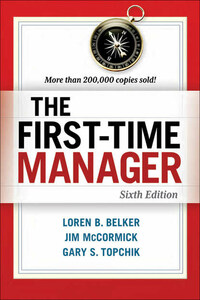The First-Time Manager

It is shortlisted for the Chartered Management Institute's Management Book of the Year award 2012. What's a rookie manager to do? Faced with new responsibilities, and in need of quick, dependable guidance, novice managers can't afford to learn by trial and error. The «First-Time Manager» is the answer, dispensing the bottom-line wisdom they need to succeed. A true management classic, the book covers essential topics such as hiring and firing, leadership, motivation, managing time, dealing with superiors, and much more. Written in an inviting and accessible style, the revised sixth edition includes new material on increasing employee engagement, encouraging innovation and initiative, helping team members optimize their talents, improving outcomes, and distinguishing oneself as a leader. Packed with immediately usable insight on everything from building a team environment to conducting performance appraisals, «The First-Time Manager» remains the ultimate guide for anyone starting his or her career in management.







